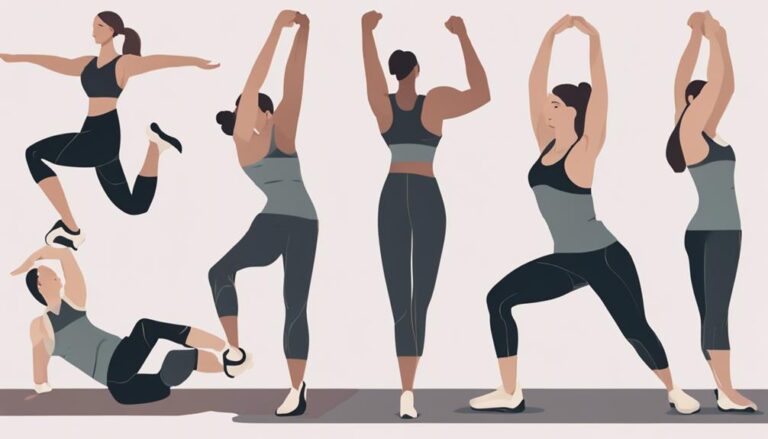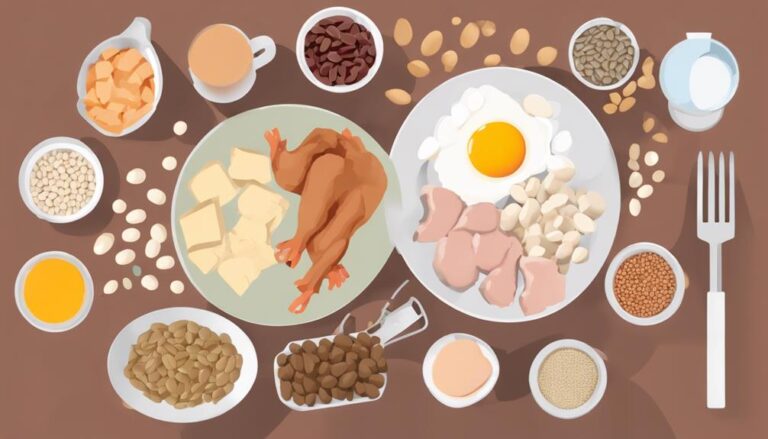What Are the Best Strategies for Weight Loss?
Wondering what truly works when it comes to shedding those extra pounds?
With countless methods available, how do you know which ones are the most effective for you?
By incorporating a few key strategies, you can set yourself on the right path towards achieving your weight loss goals.
But what are those strategies, and how can they help you on your journey to a healthier you?
Key Takeaways
- Setting SMART goals and tracking progress is crucial for successful weight loss.
- Balancing diet quality and consistent exercise optimizes weight management results.
- Planning meals, balancing nutrients, and managing portion sizes are key for healthier choices.
- Regular exercise, stress management, and professional guidance enhance the weight loss journey.
Setting Realistic Goals
To achieve successful weight loss, it's crucial to set realistic goals that align with your capabilities and lifestyle. Goal setting is a fundamental aspect of any weight loss journey. When establishing your objectives, it's essential to consider implementing mindful eating practices. Mindful eating involves paying full attention to the sensations you experience while eating and making conscious food choices. By incorporating this approach into your daily routine, you can develop a healthier relationship with food and prevent overeating.
When setting your weight loss goals, ensure they're specific, measurable, achievable, relevant, and time-bound (SMART). For instance, instead of aiming to 'lose weight,' a SMART goal would be to 'reduce your waist circumference by 2 inches in the next two months by practicing mindful eating and engaging in regular physical activity.' This goal is clear, quantifiable, feasible, meaningful, and has a set timeframe, increasing your chances of success. Remember, setting realistic and attainable goals is key to sustainable weight loss progress.
Balancing Diet and Exercise
To effectively manage your weight, remember that the quality of your diet plays a crucial role. Combine this with a consistent exercise routine to optimize your results.
Make sure to regularly track your progress to stay motivated and make necessary adjustments.
Diet Quality Matters
Achieving successful weight loss involves striking a balance between the quality of your diet and the effectiveness of your exercise routine. Meal planning and nutrient balance are key components to consider when focusing on diet quality. Planning your meals ahead of time can help you make healthier choices and avoid impulsive eating decisions. Ensuring a proper balance of nutrients, including carbohydrates, proteins, fats, vitamins, and minerals, is essential for overall health and weight management. Below is a table summarizing the importance of meal planning and nutrient balance in achieving weight loss goals:
| Meal Planning | Nutrient Balance |
|---|---|
| Helps make healthier choices | Essential for overall health |
| Prevents impulsive eating | Aids in weight management |
Consistent Exercise Routine
When focusing on weight loss, maintaining a consistent exercise routine alongside a balanced diet is crucial for achieving long-term success. Here are four key points to consider:
- Fitness Consistency: Regular physical activity is vital for weight loss. Aim for at least 150 minutes of moderate-intensity exercise per week.
- Workout Variety: Incorporate different types of exercises to keep your routine engaging and target various muscle groups.
- Sustainable Exercise: Choose activities you enjoy to make sticking to your routine easier in the long run.
- Gradual Progress: Start with manageable goals and gradually increase the intensity or duration of your workouts to avoid burnout and injuries. Remember, slow progress is still progress.
Track Progress Regularly
Regularly tracking your progress in both diet and exercise is essential for effectively managing weight loss goals. Progress tracking allows you to identify what is working well and what areas need improvement. Keeping a record of your food intake and physical activity helps you stay accountable and motivated on your weight loss journey. To enhance your progress tracking efforts, consider involving accountability partners who can support and encourage you along the way. Whether it's a friend, family member, or a professional, having someone to share your successes and challenges with can make a significant difference in achieving your weight loss goals.
| Benefits of Progress Tracking | Tips for Accountability Partners |
|---|---|
| Helps monitor your success | Provide positive reinforcement |
| Identifies areas for improvement | Set realistic and achievable goals |
| Motivates you to stay on track | Offer support during setbacks |
Prioritizing Sleep and Stress Management
To achieve successful weight loss, remember that prioritizing sleep is crucial for overall health and well-being. Quality sleep impacts hormone regulation and metabolism, which are key factors in managing weight.
Additionally, incorporating stress reduction techniques and making time for relaxation can help combat emotional eating and promote a healthier mindset towards food and exercise.
Sleep Quality Impact
Prioritizing quality sleep and effective stress management are foundational strategies for achieving successful weight loss. To improve your sleep quality and support weight loss efforts, consider the following:
- Establish a consistent sleep schedule: Maintain a regular bedtime and wake-up time to regulate your body's internal clock.
- Create a relaxing bedtime routine: Engage in calming activities before bed to signal to your body that it's time to wind down.
- Optimize your sleep environment: Ensure your bedroom is cool, dark, and quiet to promote restful sleep.
- Limit screen time before bed: Minimize exposure to electronic devices that emit blue light, which can disrupt your sleep patterns.
Stress Reduction Techniques
For effective stress reduction techniques that complement your sleep quality efforts and support weight loss, consider incorporating mindfulness practices into your daily routine.
Meditation techniques, yoga practices, breathing exercises, and mindfulness practices can help lower stress levels, improve sleep quality, and aid in weight loss.
Meditation involves focusing your mind and eliminating the stream of jumbled thoughts that may be crowding your mind and causing stress.
Yoga combines physical postures, breathing exercises, and meditation to promote relaxation and reduce stress.
Breathing exercises, such as deep breathing or diaphragmatic breathing, can help calm your mind and body.
Mindfulness practices encourage living in the present moment, which can reduce stress and emotional eating, supporting your weight loss journey.
Importance of Relaxation
Why is relaxation, particularly focusing on sleep and stress management, crucial for your overall well-being and weight loss goals? Here are four key reasons:
- Quality Sleep: Adequate sleep is essential for proper hormone regulation, including those that control appetite and metabolism.
- Stress Reduction: High stress levels can lead to overeating and weight gain. Implementing stress relief techniques can help manage your weight more effectively.
- Mindful Relaxation: Practicing mindfulness can improve your relationship with food, helping you make healthier choices and avoid emotional eating.
- Balanced Hormones: Chronic stress can disrupt hormone levels, impacting weight loss efforts. Prioritizing relaxation can help maintain hormonal balance for better results.
Tracking Food Intake
To effectively manage your weight loss journey, keeping track of what you eat can provide valuable insights into your daily food intake. Mindful eating involves being present while consuming your meals, paying attention to hunger cues, and savoring each bite. This practice can help prevent overeating and promote better food choices.
Food journaling is another effective method for tracking food intake. By writing down everything you eat and drink throughout the day, you can identify patterns, track your progress, and become more aware of your eating habits.
Research suggests that individuals who track their food intake are more likely to lose weight and keep it off in the long term. By documenting your meals and snacks, you can better understand your calorie consumption and make adjustments as needed. Remember to include portion sizes and details about how the food was prepared.
Utilizing apps or traditional pen-and-paper methods can both be effective ways to track your food intake consistently. By incorporating mindful eating practices and maintaining a food journal, you can enhance your weight loss journey and achieve your goals.
Incorporating Strength Training
Incorporate strength training into your weight loss journey to enhance muscle tone, boost metabolism, and improve overall body composition.
Here are four reasons why incorporating strength training is beneficial for weight loss:
- Muscle Building: Strength training helps increase muscle mass, which in turn boosts metabolism. Muscles burn more calories at rest than fat, aiding in weight loss over time.
- Improved Metabolism: Resistance training not only burns calories during the workout but also leads to an 'afterburn' effect where the body continues to burn calories post-exercise. This can help in creating a calorie deficit necessary for weight loss.
- Enhanced Fat Loss: Strength training, when combined with cardio, can enhance fat loss while maintaining muscle mass. This is crucial for achieving a leaner and more toned physique.
- Better Body Composition: By incorporating strength training, you can achieve a more balanced body composition, where fat mass decreases, and muscle mass increases. This not only aids in weight loss but also improves overall health and fitness levels.
Staying Hydrated
Staying adequately hydrated throughout your weight loss journey is essential for optimal health and successful outcomes. Hydration benefits extend beyond just quenching your thirst; water intake plays a crucial role in weight loss. Drinking an adequate amount of water can help boost metabolism, reduce appetite, and enhance calorie burning. Studies suggest that drinking water before meals can lead to consuming fewer calories, aiding weight loss efforts. Additionally, staying hydrated can improve exercise performance, making your workouts more effective.
To ensure you stay hydrated, carry a reusable water bottle with you throughout the day as a reminder to drink water regularly. Aim to drink at least 8-10 cups of water daily, adjusting this amount based on your activity level and climate. Choosing water as your primary beverage over sugary drinks can also help reduce calorie intake and support weight loss.
Avoiding Liquid Calories
As you focus on optimizing your hydration for weight loss, being mindful of avoiding liquid calories is crucial in achieving your goals effectively.
Here are some strategies to help you steer clear of excess liquid calories:
- Choose Water: Opt for water as your primary beverage. It's calorie-free and essential for overall health and weight management.
- Beware of Sugary Drinks: Sugary beverages like sodas, sweetened teas, and energy drinks can add significant calories to your diet without making you feel full. Be mindful of their consumption.
- Read Labels: Check the nutrition labels on beverages for hidden sugars and calorie content. Many seemingly healthy drinks can be high in calories.
- Consider Sugar Substitutes: If you crave sweetness in your beverages, experiment with sugar substitutes like stevia or monk fruit. These can help satisfy your sweet tooth without the added calories.
Managing Portion Sizes
To effectively manage your weight, mastering the art of portion control is key to achieving your health goals. Portion control involves being mindful of the amount of food you consume at each meal or snack. By practicing portion control, you can better regulate your calorie intake, which is crucial for weight management. It's essential to be aware of serving sizes recommended for different food groups to maintain a balanced diet.
Mindful eating is a helpful strategy when it comes to portion control. This approach encourages you to pay attention to your food, savor each bite, and listen to your body's hunger cues. By eating slowly and being present during meals, you're more likely to recognize when you're full and avoid overeating.
One practical tip for managing portion sizes is to use smaller plates and bowls. This visual trick can make your portions appear larger, helping you feel satisfied with less food. Additionally, measuring your food, reading labels for serving sizes, and avoiding distractions while eating can support your portion control efforts. Remember, mastering portion control is a sustainable way to support your weight loss journey.
Seeking Professional Guidance
For personalized guidance and support on your weight loss journey, consider consulting with a qualified healthcare professional or registered dietitian. Seeking professional guidance can provide you with valuable insights tailored to your specific needs and goals. Here are four reasons why professional support is beneficial:
- Personalized Plans: Healthcare professionals or dietitians can create customized meal plans and exercise routines based on your individual requirements and health status.
- Monitoring Progress: Professionals can track your progress, making adjustments as needed to ensure you stay on the right track towards your weight loss goals.
- Addressing Mental Health: A trained professional can help address any mental health issues related to weight loss, providing support and strategies to overcome emotional eating or body image concerns.
- Evidence-Based Advice: Professionals offer evidence-based advice, ensuring that you receive accurate information and safe practices for effective weight loss.
Conclusion
So there you have it, folks! The best strategies for weight loss may seem simple, but they require consistency and dedication. Remember, there's no magic pill or quick fix – it's all about making sustainable lifestyle changes.
So go ahead, set those realistic goals, balance your diet and exercise, prioritize sleep, and don't forget to stay hydrated. And if all else fails, remember that seeking professional guidance is always a smart move.
Happy weight loss journey!







